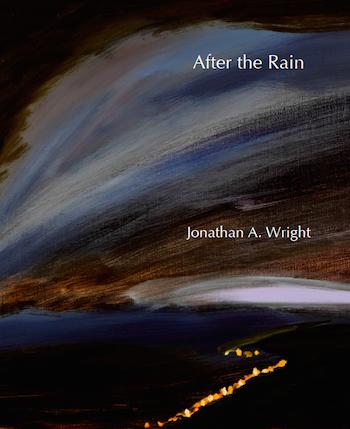“An alert and loving eye for the natural world informs After the Rain, and through arresting moments of sadness and old griefs survived, Wright gives us solace and delight in a beautiful series of lessons in the alchemy of art.”
– Christopher Lydon, acclaimed journalist who currently hosts and produces Radio Open source on WBUR, Boston.
“Fashioned by the hand and heart of a seasoned sculler and a builder of dignified places, here are poems charged with the tingling awareness of a presence that longs to make itself known in all things and at all times. Wright is occupied with rivers, stones, trees, skies, and also with the beautiful fleshliness of love, including its debris of grief.”
– The Right Reverend A. Robert Hirschfeld, Episcopal Bishop of New Hampshire and an accomplished writer and sculler.
“While Wright’s poems carry the heavy freight of human sadness, longing, and loss, they also celebrate joy through deeply felt meditations on familial love and a longstanding intimacy with the natural world. Nature is the primary lens through which the poet reveals territories of mind and heart that are alternately thrilling and unsettling. Beneath their lovely surfaces, the poems probe the questions we all ask: What does it mean to have human consciousness in a world that keeps its own counsel? How can we bear the grief of losing what we love? After the Rain is a book lit from within by language that clarifies and distills.”
– Chase Twitchell, author of 5 books of poetry, has received numerous awards, and writes from her home in the Adirondacks.
Press
“Unlike his favorite river, Jonathan Wright’s poetry runs so deep” by Trish Crapo, Portland Press Herald, November 9, 2014
Book Review: “Poems are inspired by rowing” by Trish Crapo, Burlington Free Press, November 7, 2014
Poets of Franklin County: ‘A threshold between the sky and the earth’ by Trish Crapo, The Recorder, October 24, 2014
Book Review: After the Rain by Jonathan Wright by Janet McKenna Lowry, NESEA, September 23, 2014
Jonathan A. Wright’s Poetry Reading
Watch:
Produced by ReelifeProductions.com
Listen:
A Sample of Poems from After The Rain
Before the Rain
Before I can languish
in the drapery folds of tomorrow
or unpack today
of its rumble seat of luggage
I must prepare the lake for rain;
I have been given instructions.
First I polish its surface with pumice
in a soft cream, then jewelers rouge
with a faded plaid cotton
rag from childhood pajamas
worn for hiding from thunder.
Fresh ground coffee is foretold.
I wipe the soft glass of it
clean like the picture of wild fires
over the mantle.
Once again undisturbed,
the lake requires combing
with a stiff boar bristle brush
of fresh wind,
a bamboo chime rattle
of linden leaves,
and the questions raised
in the throat talk of thunder,
anticipating.
The lake is peaceful,
smoothed by my treatment,
and slowly bright flashes
marking the approach
of rain, the quiet
that restlessness washes in,
a silence embedded in fury,
begin in my mind.
Begin
Begin again. Right away
before the glue sets.
Begin again. Watch for
signs of early frost.
Begin again. Read the
Sunday Times for clues.
Begin again. Walk to the edge
of the pond and foresee open water.
Begin again, mid ocean,
storm jib and reefed mizzen taut.
Begin again, when the far shore
fails to appear.
Begin again, where the sky
tumbles black and moody
down into the sea.
Begin again. Place your oar
squarely at the edge of
the end of the world.
Begin again.
Paine’s Creek
His family was thinking
about the sea, painfully,
but his ashes drove down wind
into the creek
where the tide rests
in the nest of tall grass;
hesitation at the edge
of fresh ebb is prayer,
not spoken but washed in:
alewives and spawn,
water lifted and drawn
across mud flats and
dark mussel shells, coursing
the gravel and broken and sand,
choosing a remembered dawn.
Reader’s Comments
“These poems are tender, vulnerable weavings of delicate insights and gentle humanness, offered to the reader with gentleness and respect.”
– JK

